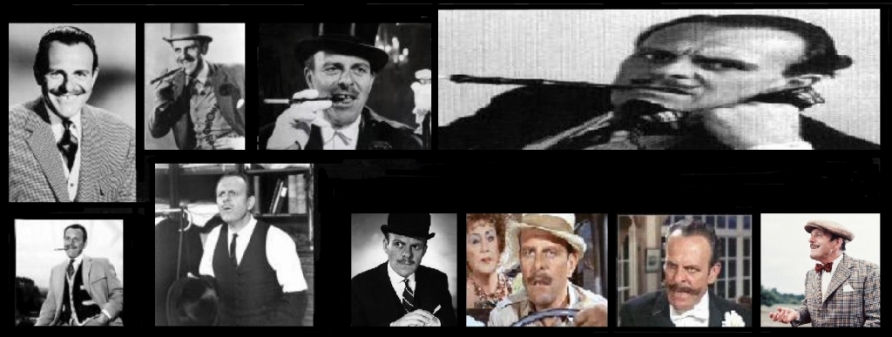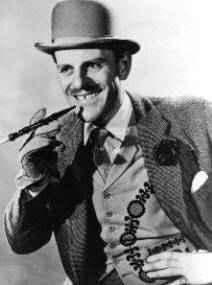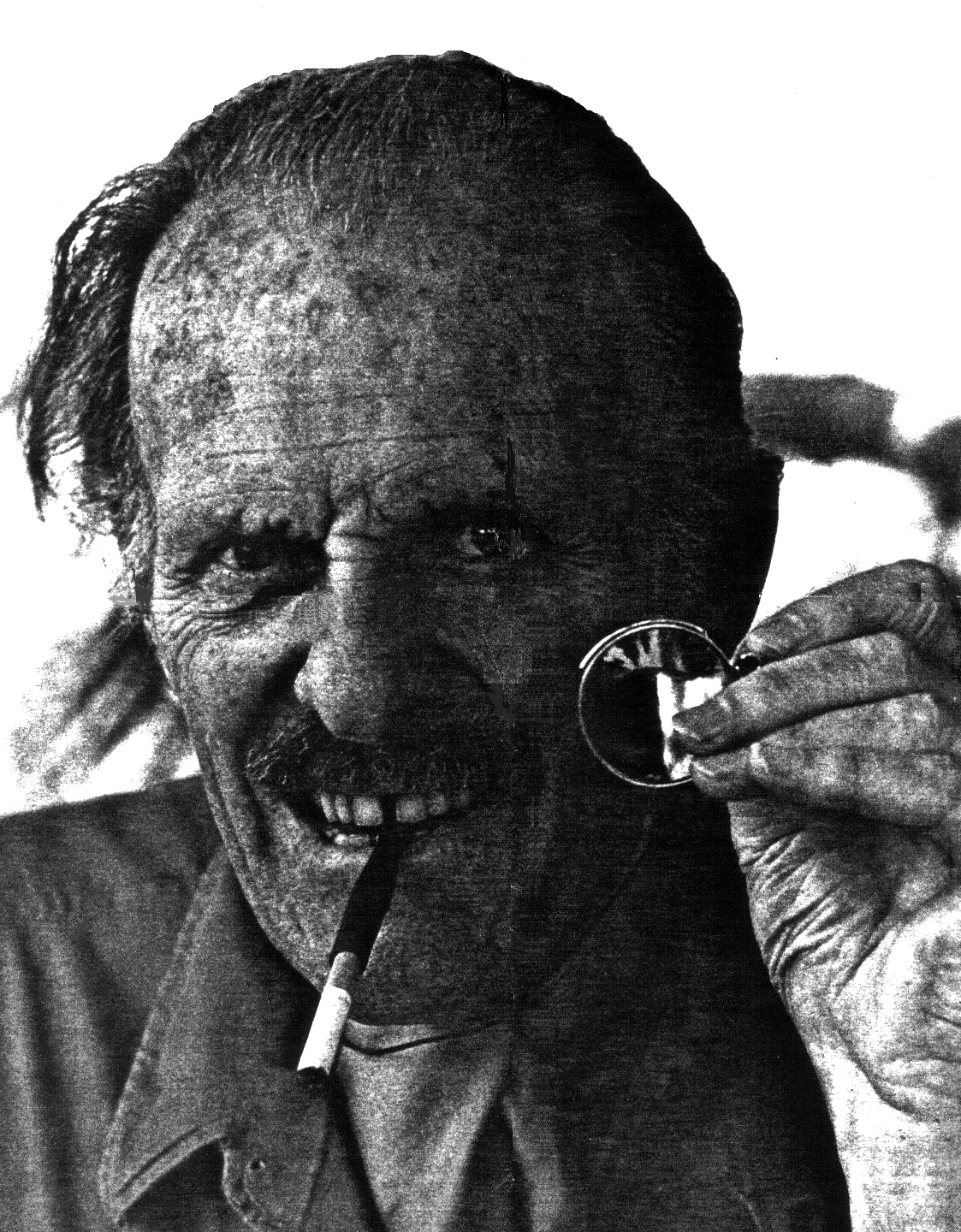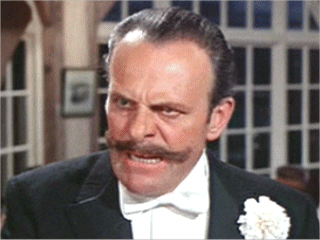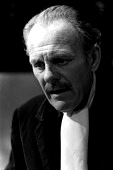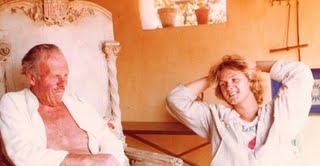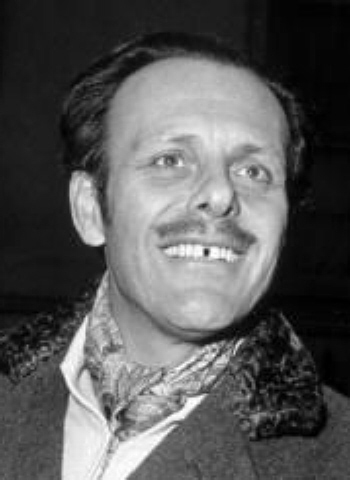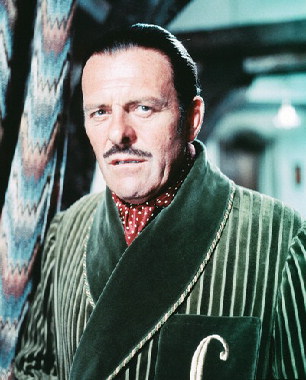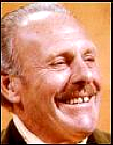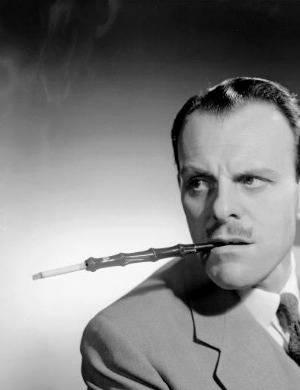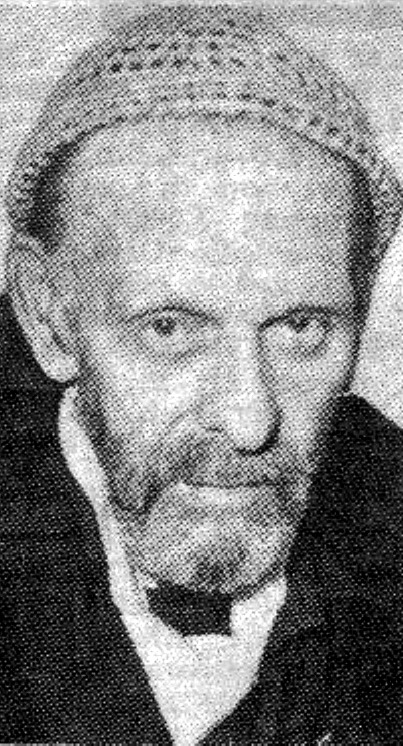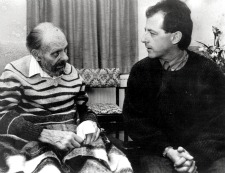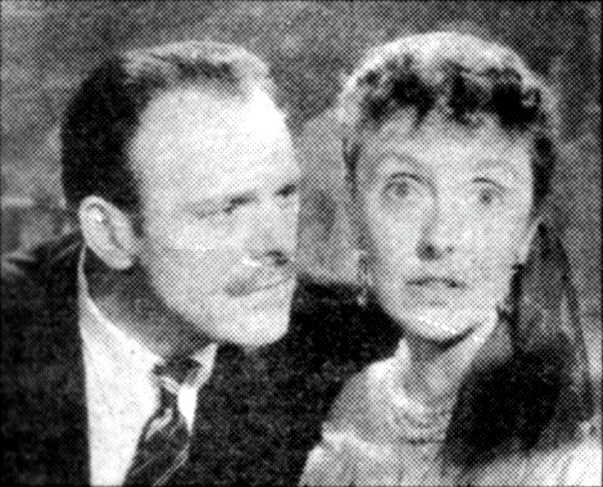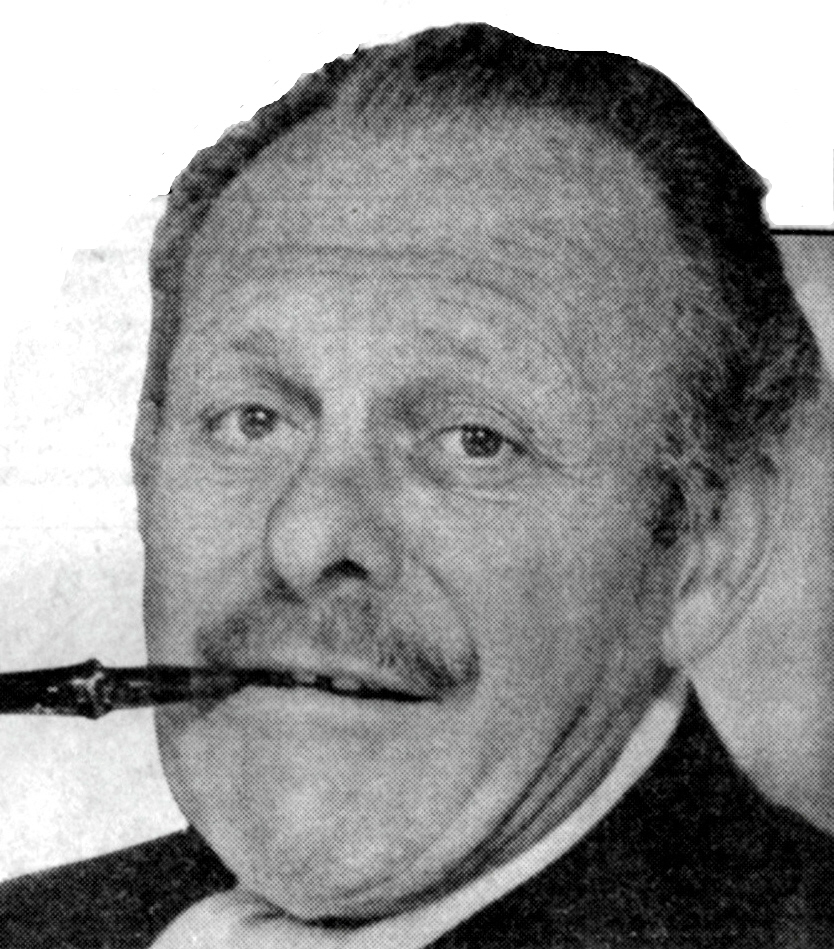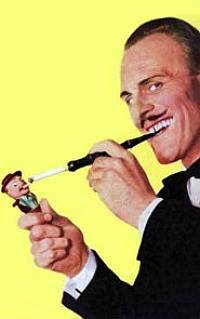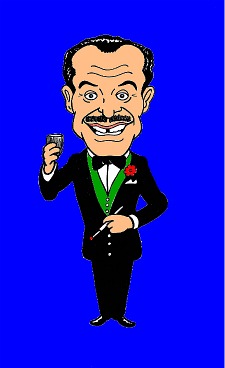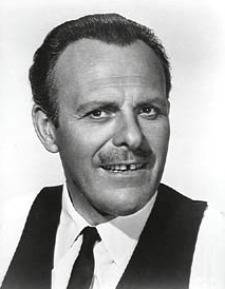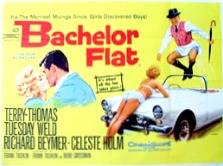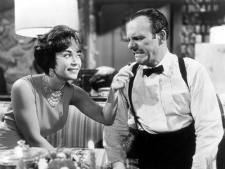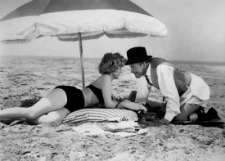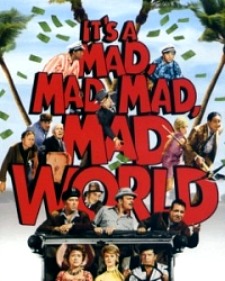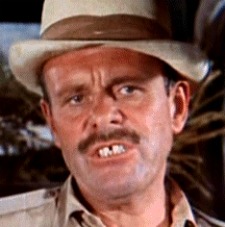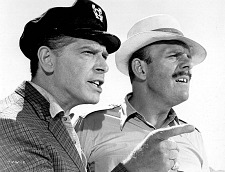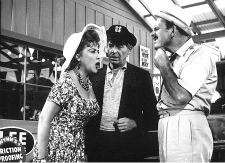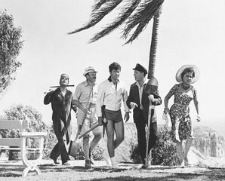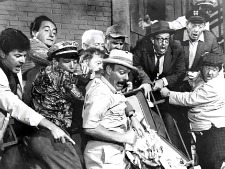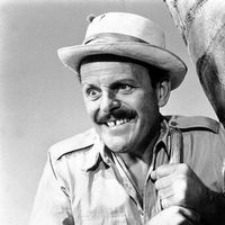|
Terry-Thomas Tales....
A collection of quotes, interviews and articles about the great and much-loved Terry-Thomas....
The following article is transcribed from a 1982 edition of YOU:
Comedians traditionally have a darker side to their lives and Terry-Thomas, eternally cast as the eccentric, upper-class Englishman, roguish and rich, has not escaped that fate. Shirley Flack visited him at his home in Majorca....
Terry-Thomas does not say 'Jolly good show' any more. The famous grin - caddish, toothish, knowing, saying more than any dialogue is rare. There were a few such smiles when we met, however, especially for the camera. As true a trouper as ever, he wanted to look right for the photographs.
'Have you told them our good news?' said Belinda, his wife, joining us at the table in the garden under the shady palm soon after we arrived. The good news turned out to be this week's new diet for Terry: mostly raw vegetables, lots of lemon juice and supposed to be a marvelous help for muscular pains.
T-T knows all about pain. Since the first tremor experienced on tour in Australia 12 years ago, through the intermittent attacks when his behaviour could have been mistaken for a little too much to drink, until today, when he is totally dominated by Parkinson's Disease, he has come to endure physical suffering and the mental anguish and frustration of helplessness. His wife had great hopes of this new diet....as she had of all the other treatments they had tried.
'We've done the circuit of medical help. It's terrible difficult to make up one's mind what to do about it, really. Sometimes one accepts it and goes along with it, but then it's dreadfil to see, so awful when he's in pain that you can't really accept it, you have to go on following up every lead, looking for a possible treatment, dare I say cure. The day will come when we'll have just have to say....' She tails off, at a loss to finish the sentence.
'In a way I think that if we did accept it, it might be better, it might be more relaxed. I even imagine then that if we stopped trying to fight it the pain might go away. But it's always might and if. He copes so wonderfully, he's so brave, he's always wanting to do things but the illness just won't allow him.'
They live together behind yellow-painted shutters in the house that Pat Lansky built. She was T-T's first wife and, before that, his dancing partner in the days when their act consisted of three passionate Spanish dances. In a more lucid interview years ago, he told me: 'I gave up the act because I realised if I continued I ran a serious risk of being severely ruptured. I started telling dirty stories instead in cabaret in what in those days were known as upholstered sewers....the nightclub circuit.' For this he perfected his costume of a dinner jacket, red carnation, and long cigarette holder. He's used a long cigarette holder anyway to keep the smoke out of his eyes a the card table, and hung on to it long after he'd given up smoking on hs doctor's advice.
'Not a day goes by we don't think about Pat,' said Belinda. 'Of all the little things she did here and this sweet little pool that she made. It's very sad that we don't still have her piano.....there was a misunderstanding, it got into the hands of a dealer and when I tried to get it back it was too late. My fault really.'
Moving to the house in Majorca ('We loved Ibiza but this is so civilised by comparison, we even have a telephone.') enabled them to put their Ibizan house on the market in order to raise much-needed capital.
'We had a marvelous deal going with some Germans, but it fell through unfortunately.'
Their two sons, who live in England (Tiger, 20, a house decorator and Cushan, 16, at boading school), were over on a visit. Both seemed very protective of their parents. 'They're wonderful, we absolutely adore them,' said Belinda. 'They keep coming back and giving us a booster.'
She and Terry call each other Mac. Belinda flutters about like a butterfly, finding the right place to sit, first in the sun then, when it is too hot, moving him into the shade. She frequently apologises for what she sees as some fault in herself. 'If I were a better cook, If I were better able to understand, If I were better organised....I'm sure I should be able to organise myself better; as it is, it's a full-time job looking after Terry. My priority is to maintain a fairly tranquil atmosphere in the house, but somehow I cannot achieve that. Terry and I are always striving for the sort of life with me sitting nice and relaxed and doing my sewing and somebody else doing the cooking, but it never works out that way.'
Terry is central to the conversation, listening intently. When he speaks his voice is so faint that we all crane forward to catch the words. Occasionally he managed to complete a sentence. 'The hardest thing is not beng able to explain. To have lost the ability to communicate causes such frustration.'
'He was longing to tell you funny things. He worked out so many didn't you darling? You were going to tell her about how you bought me the car....there was a lot more to it than that, remember?' said Belinda.
His expression showed he was striving to concentrate, to remember, to recount the amusing anecdote he had prepared. we waited. 'Well never mind darling, tell them later,' said Belinda.
They met 25 years ago when Belinda was working as a hotel receptionist and Terry booked into the hotel. It was an immediate and strong attraction on both sides despite the age gap. She was 21, he was 48, at the peak of his career, a star who had gone from cabaret to radio and television and film, much sought after as a character actor of cameo roles. He had been enthusiastically take up by Hollywood, seen in America as the archetypal upper-class English type.
'Hollywood was lovely,' says Belinda. The parties, the servants, the excitement. We loved all that. But one thing has always intrigued me. Before Terry and I were married we were in Hollywood and we went to see his friend Noel Langley, and Noel told Terry's fortune, and he told him something very important whichTerry always promised to tell me one day. But now that he says he's ready to tell me, he's forgotten. I suppose I shall never know.'
'I know it concerned me, because at that time he couldn't decide wether to marry me or Lorrae Desmond. She came over to see us last Sunday, flew all the way from Australia, booked into a hotel, came straight on here, and flew back the next day. Isn't that marvelous? She's remained a great friend.'
'Looking back, I was terrified of the competition at the time, especially when I eventually got to meet her. I was a real scraggy bag and she was this lovely, luscious, sexy woman....we sat up all night and got drunk and talked and talked and watched the dawn come up. The next time I saw her we were in Australia and it was the first time Terry discovered he had the tremor and that was the beginning....'
We selected what Terry should wear for the photographs from the neat array of colour co-ordinated smoking jackets and silk cravats in his wardrobe. He has a favourite hat, sewn from red and white handkerchiefs, to enable him to have it in his pocket without spoiling the look of his jacket.
During this interval Belinda prepared his lunch, cutting the vegetables in uniform pieces, arranging the tray carefully. 'Terry is a perfectionist, and he has made me into a perfectionist. Whilst you're taking two hours to make a salad look perfect, the clock is ticking away and life is passing by.'
We had planned to keep our visit short, not wanting to impose on his energy and Belinda's routine, but in the event ('He is enjoying this so') were encouraged to stay.
Terry fumbled for the words to express his feelings, recalling his happiest times (the films with Peter Sellers, the London Palladium) and the worst, most recent tmes. 'Feeling seedy all the time causes such depression. The psychology plays an enormous part, and of course it is possible to overcome things for a certain time, but it takes a hell of a lot out of you and then you regress. It is a case of one step forward two steps back. The hardest thing...I want to say things to Belinda I cannot say. We both try to explain things to one another.....we're not getting anywhere.'
For long periods he appeared fascinated by the seeds from the date palm that littered the ground around our feet, bending painfully to pick them up and examining them minutely in the palm of his hand. He last worked in 1981 when, although he was ill, he felt he could control the situation sufficiently to appear in carefully rehearsed TV situations, and made several lucrative commercials. He worries a great deal about money.
'If I'd been told then that in a few years I'd be earning nothing, I would have done things differently.' said Terry, 'Money has to be cossetted..You can't fool around with it, you have to watch it. Belinda's spendthrift ways are a continual problem.'
'I've been trying to get in touch with God on Terry's behalf.' said Belinda, 'And that makes him angry. Sometimes I really put it on and start putting an extra glass or chair at the table. I've always loved God, but since our neighbour started taking me to evangelical sessions I have become more extrovert about it. A woman friend in the group said she was getting messages from God that she must go to Terry andgive him relief from pain and peace of mind. Unfortunately....it wasn't that Terry didn't like her, but she had very hot hands.'
'Terry didn't care for that; he thinks the whole thing is laughable. He told her he did like Jesus Christ but he didn't like his disciples. If somebody is coming straight from God, then surely that person would be beautiful, wouldn't have hot hands or bad breath. That's what we're looking for, the real thing.'
'It's no good asking why this had to happen to me,' said Terry. 'There aren't any answers. The only thing we know definitely is that things get worse. There is no way of improving. You ask me how it feels....there is a whole plethora of symptoms. Now I have said that.....other time I cannot say the simplest possible word lke lavatory paper.'
He started to describe the sensation of confusion his illness brings. Each time he began he stopped after a few words and began again from a different direction as if trying to find a way through a maze, each time hitting a dead end.
'People don't give a bugger about anybody any more, you know,' Belinda said somewhat angrily. 'It's only money and attraction they care about. If somebody is old, ill or poor, they don't want to know.'
'You don't know what you're talking about, you're not making sense,' said Terry. 'We keep meeting doctors and all their sympathy seems to be directed at me,' said Belinda.
Several times Terry said he was searching for a word, a special word that would sum up his current predicament. Eventually he remembered, and managed to enunciate it. 'Bradykinesia. It means I am trying to say something, but if I manage to say it I cannot be sure that when I say it it will make any sense. Bradykinesai means small passages; if you get stuck between two walls you cannot turn round, you lose your balance...doors close just as you reach them.'
His most articulate period was when he said: 'It would be better if I wasn't here. It would give Belinda a chance. But I know it would be very difficult for her to adjust to life if I kicked the bucket. She doesn't understand money, you know....If it weren't for her I wouldn't think twice about getting out of it now. It isn't really worth the life. It's all very well for people to say it's worth the effort.....is it?'
As we were leaving he suddenly remembered the funny story he wanted to tell us. 'I decided to buy Belinda a little car because she works sp hard looking after me that I thought she deserved it. I bought her the car and now I don't see anything of her, she's always at the beach.'
It could have been funny, and we all laughed although plainly Belinda had not visited the beach for many weeks.
I remembered Terry once telling me that he started out 'playing dramatic roles but the audience always ended up laughing. I saw myself as a sort of Ivor Novello, but there was something about me that turned tragic lines into a joke.'
Now it is the other way around. The jokes come out sounding tragic.
************************************************************
This next article was first printed in THE SUN newspaper on April 11, 1989 and was written by Richard Wallace......
TERRY-THOMAS SOBS AS HE SEES TRIBUTE ON VIDEO
Friends' film show for stricken star
Ailing actor Terry-Thomas choked back tears last night as he watched a video recording of the moving showbiz salute to his talents.
The stricken star, penniless and crippled with Parkinson's Disease, was too ill to attend the star-studded West End stage show on Sunday.
But friends videoed the marathon four-hour performance, which raised £75,000 for tragic Terry, 77. And yesterday he watched it at his spartan South London charity-owned flat with his devoted wife Belinda.
Organisers hope to raise another £500,000 through sales of the video to buy Terry a luxury flat and help other sufferers.
Belinda said "I can't thank everyone enough. Terry is extremely frail but has been deeply touched by people's kindness."
Phil Collins, Richard Briers, Nigel Havers, Judi Dench and Barbara Windsor were among other big names at the sell-out charity gala.
"He's a fantastic actor, a part of my past." Phil said. "All I could do was put in my two penny-worth for him."
TV's Richard Briers, Terry's second cousin, said "The last five or six years have been horrendous for him. Parkinson's Disease is the cruellest disease there is."
The illness, a nervous disorder, causes uncontrollable trembling and emaciation.
The only black mark on the evening was when broadcaster and journalist Daniel Farson was thrown oujt of the theatre after hurling slurred abuse at arriving guests.
Organiser Richard Hope-Hawkins: "Apart from that the evening was splendid and surpassed all expectations."
************************************************************
Daily Mail, Tuesday January 9, 1990 (Written by Barry Baker)
TERRY-THOMAS,HOLLYWOOD'S FAVOURITE ENGLISHMAN, DIES AT 78
The most noble cad of them all....
The more Terry-Thomas tried to play the old-world English rotter, the more his fans loved him.
This great comedy actor, who died yesterday, could not even pretend to be nasty. Behind the carefully scripted eccentricity and pomposity lay something immensely attractive, and that was his Englishness.
This is a curious characteristic and Terry-Thomas exemplified it. Englishness means an innate fortitude disguised by self-mocking humour. It is an extraordinary quality, because it is about self-confidence, the kind of inner strength that is not afraid of anything, even of appearing absurd.
In classic British comedy movies like Carlton-Browne Of The F.O. and Those Magnificent Men In Their Flying Machines (when there was still a home film industry), Terry played the cad, the bounder and the thoroughly loose fish. And yet we loved him. Gap-toothed and absurdly moustached, he even appeared a bit of a ladies' man.
The tributes which came yesterday showed that he was a fine actor in front of the camera, and a true friend behind it. He was happy to play the foil to genius talents like Peter Sellers and Richard Attenborough, and feed them some of their greatest moments.
Later, when he contracted Parkinson's Disease, we saw the strength behind his humour. He lost the fortune he made appearing in nearly 200 films, to medical and nursing fees, and ended up, with his lovely wife Belinda, in a tiny charity flat in London.
He didn't complain. He didn't appeal to his many rich and influential friends. In fact, it wasn't until a Sunday newspaper revealed his plight that Terry finally received the help he richly deserved.
Last year a special benefit at London's famous Drury Lane Theatre raised £100,000 to pay for treatment at a private hospital in Surrey. Terry, the archeytpal Englishman, at last tapped into another aspect of our national character, compassion.
He died there yesterday. His wife is in the same hospital now, near to a nervous breakdown, because of the strain of nursing him. He wasw 78 and had fought Parkinson's Disease for the past 18 years. He had not been able to work through the late Seventies and Eighties and, shamefully, became British cinema's forgotten star.
Until his illness he was rarely off the wide screen, inevitably playing the same kind of caddish, waggish character in box office hits like Blue Murder At St Trinians and How To Murder Your Wife.
His smile was almost a leer, and the front teeth seemed designed to have a long cigarette holder lodged between them. His diction was impeccably absurd.
He was the 'silly-ass' to finer actors' charcterisations. They all traded off hs willingness to be ridiculous.
Terry was always presented as having a way with the ladies. But he played the male predator in an era before rock and roll defined men. He was the comfortable charmer whose ultimate sexual aim was a kiss, and that coy roguishness made his audiences feel comfortable too.
Terry typified the Ealing Comedy age when Englishness was quaint and loveable and social realism was just an idea in the minds of socialist screen writers.
Nevertheless, the London-born public schoolboy was always surprised at the popularity of his screeen image. He once said "This typically English thing is a bit of a sham, I suppose, because, as you know, I have made all my money by sending up pompous Englishmen."
He was as popular in Hollywood in the Sixties as he was here and his catchphrase "Oh , jolly good show!" became world famous. But Parkinson's Disease first struck in 1971, and by 1984 doctors gave him only four more years to live.
Towards the end he was unable to feed, wash and clothe himself. Among many tributes yesterday was one from Minder star George Cole, who appeared with Terry in several films. He sais "He was an impeccable man with impeccabe timing and a delight to work with."
Comedy actor Derek Nimmo praised his courage, saying "He was a lively, bubbly character who bore his illness bravely - great fun and generous to teh end. I was shocked to find he had spent so long living in such appalling conditions."
Other friends said that he was as eccentric in real life as he was on screen, but that he was a much kinder personality.
He was born Thomas Terry Hoar-Stevens, in Finchley, in 1911. At school he excelled at drama, but was unruly enough to be expelled from the choir. After arny service he had a variety of jobs, and his wit made him a popular figure at showbusiness parties.
Then an American impressario persuaded him to try his luck on the stage so he began as a stand-up comedian telling, what were then, risque jokes, and developed the smopoth, up-market car salesman image. He quickly moved into films when British screen comedies were at their height.
He changed his stage name from Thomas Terry to Terry-Thomas because fans believed he was related to actress Ellen Terry. He said that he inserted the hyphen to symbolise the gap in his teeth.
He married former actress Belinda, now 52, in 1964 and the couple had two sons, Rupert and Timothy.
Terry used much of his fortune to buy property on the Mediterranean islandsof Majorca and Ibiza, buthe was no businessman. His sons still manage his villas, but have lately worked as dispatch riders and odd-job men to try to help withthe cost of his nursing.
Finally he died from chest complications related to his illness. Some years ago he had watched his great friend Kenneth Moore die of Parkinson's Disease and he said later "It was the most terrible thing to watch a friend endure."
That Terry should endure the same end with such fortitude and patience says much for his character. He was the most noble cad of them all.
*************************************************************
|
|
|
Terry-Thomas' Gap Helps Fill His Coffers
British Comedian Is Now Filming 'Bachelor Flat in Hollywood
HOLLYWOOD - Terry- Thomas is here, hyphen, gap and all.'Twas only natural that Hollywood would import one of the leading lights of England's film comedy industry. He is now acting in "Bachelor Flat" with Tuesday Weld, Richard Beymer and Celeste Holm.
Director Frank Tashlin does a rave over T-T: "He is a magnificent clown. He can even take a pratfall with dignity."The name of Terry-Thomas needs to be explained.
He was born Thomas Terry Hoar-Stevens."When I started thinking of a stage name I considered Thomas Terry, but discarded it for fear I would be presumed to be a member of the Terry family," he explained, referring to the English stage clan.
He adopted Terry- Thomas and shows mild annoyance when he is called Terry or Mr. Thomas. Friends refer to him as Tom or T-T, old friends as Mot, backward spelling of Tom.About the gap. It stretches several millimeters between his upper front teeth and lends to his comic appearance."People rush up tom me and say, 'Smile,' " he remarked. "When I do, they are very gleeful and say, "That's it!"
So influential has this feature been that he called his autobiography "Filling The Gap," which is what a lot of people want to do. But not T-T. "My family never considered orthodontics," he said. "All the females in my family have the gap, so it wasn't considered unusual. I suppose if I were a romantic type of actor, I would have done something about it. But as a boy I considered myself the Erich Von Stroheim type and was always posing with a watch crystal in my eye."
T-T and the gap have achieved fame in this country through a series of hilarious English films like "I'm Alright Jack" and "Make Mine Mink". Such comedies have proven one of the most successful British exports since Chutney. T-T fears his countrymen are pushing a good thing too far.
"You can't grind comedy out like sausage, and that's what they're trying to do," the comedian complained."My concern is that people in this country don't differentiate between the really good comedies like "I'm Alright Jack" and the vulgar ones like "Carry On Nurse". I can't stand vulgarity!"
"I suppose there is an audience for such films, just as there is for "Ben-Hur" and "Spartacus", which I considered extremely vulgar. But one can hope that the taste of audiences is rising."
He said that he has already turned down eight scripts from the sausage factories this year. His ambition now is to find a stage musical, an "American one" because the British do musicals badly.
"One might think that the wonderfully comic prop of the gap had motivated Terry-Thomas' laugh-making career. He says no."It was because I was the penultimate child of a family of five," he explained. "I was very close to my mother until my sister arrived whenI was 3. Then I was pushed out on my own, and I had to cut up to get attention. I mucked it up quite a bit!"
BOB THOMAS (May, 1961)
|
|
|
Terry's Mad World Memories
Terry-Thomas enjoyed the singular honour of being the only British comedian in the cast of Stanley Kramer's epic 1963 comedy, It's A Mad, Mad, Mad, Mad World.
Kramer had envisioned a grand, large-scale comedy - a tribute to the glory days of silent comedies, with a huge cast consisting of many of the world's most popular comedians of the day.
Terry was offered the role of Lt. Col. J. Algernon Hawthorne. It was a role he almost walked away from. "My role in It's A Mad, Mad, Mad, Mad World was another that I initially turned down then changed my mind about." said Terry. "When I was first approached in Hollywood, I said no. I didn't like the script. I then left for London but by the time I arrived I was having second thoughts."
The salary on offer was more than generous and the film would also offer Terry the chance to work alongside some of the world's greatest comedians. He had long been a great advocate of taking all the work he could manage. "One never knows when this whole thing might come to a crashing halt." he once said, prophetically.
"From the airport I telephoned producer Stanley Kramer and said I'd like to do it after all."I grabbed some sandwiches and popped back on a plane to be fitted for the part."
The plot of the film centred on an anarchic race to find Smiler Grogan's (Jimmy Durante)loot. Terry-Thomas' character, Lt. Col. J. Algernon Hawthorne, becomes entwined in one of the subplots - involving failed businessman J. Russell Finch (Milton Berle), his long-suffering wife Emeline (vivacious Dorothy Provine) and his Mother-in-Law From Hell, Mrs. Marcus (Ethel Merman). As Hawthorne, Terry first encounters them on foot hitchhiking in the middle of the desert.
"When I first joined the company, Jonathan Winters was jealous of me and took against me, always referring to me as 'the rich Englishman'." explained Terry. "It took a lot of pleading from producer Kramer to prevent him from reshaping my Bentley. Jonathan, who carried an axe as a prop, badly wanted to bash it through the bonnet of the car!."
Terry did become great friends with one particular cast member, Ethel Merman. "There was absolutely nothing negative about Ethel. She was always telling you what to do and you did it! I did, anyway. She advised me how to dress. She took me shopping. Told me exactly what to buy. She was so colourful and I was so amused by her that I let her get away with it. We lived extravagantly in every sense of the word!."
On set Ethel Merman took to giving Terry acting lessons. "I've always been open to suggestions. I mean in lfe you never finish learning. In the case of old-timer Ethel, I considered it would be impossible for her to know how a character like the one I was portraying, would behave."
One aspect of the filming which caused Terry some concern were the constant efforts of many of the comedians to upstage and outdo each other at each and every given opportunity. Terry felt it was unnecessary and highly unprofessional.
Terry's co-star, Phil Silvers, remarked "The clowning off-screen was as mad as the clowning on-screen. Everbody was doing bits. Jonathan Winters would turn up as different characters. I remember Mickey Rooney up a tree acting out dialogue from Bridge On The River Kwai!."
It was to his great delight that Terry found himself appearing alongside two of his own personal heroes, Spencer Tracy and Buster Keaton. "Normally it was a matter of course to accept the big names when you worked with them, without being thrown. However, I found I could not approach Spencer Tracy in a normal way or treat him like an everyday person."
"He was an extra-special man and it was very difficult to believe that he was real. Buster Keaton was the same. They were the only two people people who ever produced in me this awe of greatness. I just couldn't meet them without being affected."
Being a consumate professional Terry threw himself wholly into the part. When he wasn't filming he could be found enjoying the Hollywood high-life. He spent his free time in the company of Ethel Merman or comedienne Edie Adams, with whom he had also become very friendly.
"Edie Adams had recently been widowed when we met on the set of It's A Mad, Mad, Mad, Mad World." said Terry. "She was crazy, a most entertaining bird, though she used such strange jargon that, to a normal person, she was practically incomprehensible."
Despite his disapproval of the on-set and off-set hi-jinks of his co-stars, Terry settled into the gruelling filming schedule. "After a week or two, Stanley Kramer asked me how I was enjoying myself and I said 'Alright. But it's pretty tough going.' ' Why?' he asked. 'Well not only am I the only non-American in this huge cast, but also the only non-Jew.! Stanley said nothing, just smiled his twisted smile!."
Terry got to know Kramer quite well and they had enormous respect for each other. Terry particularly enjoyed Kramer's sense of humour, although on one particular occasion it almost cost a day's filming.
"We were shooting a fight scene. I had to climb out of an upturned car, scramble to the top of a bridge and jump off the side to get away from Dick Shawn. When he caught me, Dick started to twist my head off, with the words, 'Are you English?'. 'Why?' I asked. 'Don't you like the English?'."
"It was at this point that Stanley Kramer burst into his ill-timed laugh, completely ruining the shot. It was the eighteenth take and the temperature was 115 degrees in the shade. Everything had to be done again."
(Pictures) A collection of images of Terry-Thomas in It's A Mad, Mad, Mad, Mad World (1963)
|
|
